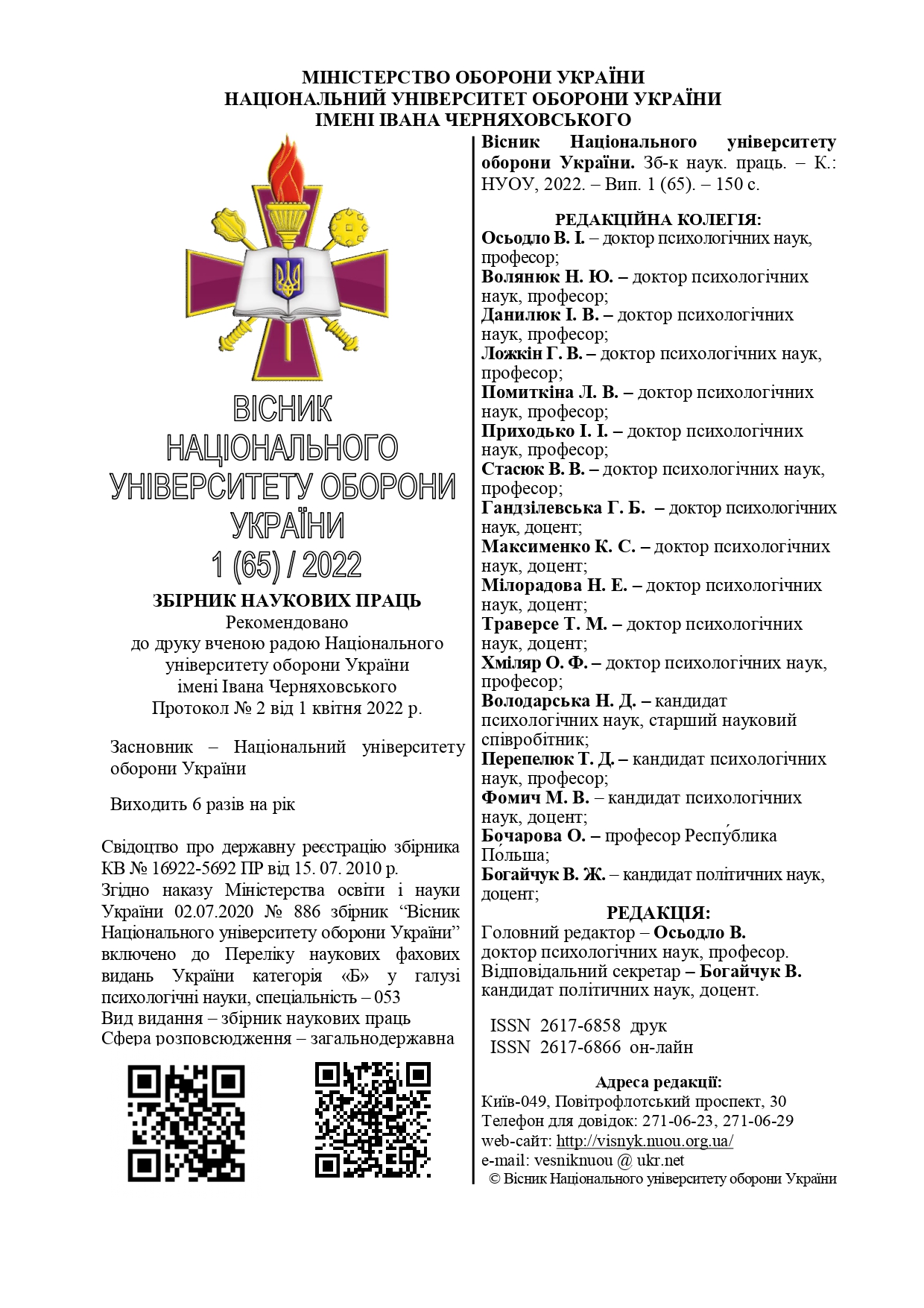ЗМІНИ В СТРУКТУРІ ОСОБИСТОСТІ У ВІЙСЬКОВОСЛУЖБОВЦІВ ВІЙСЬКОВОЇ СЛУЖБИ ЗА КОНТРАКТОМ, ЯКІ МАЮТЬ СТАТУС УЧАСНИКА БОЙОВИХ ДІЙ
DOI:
https://doi.org/10.33099/2617-6858-2022-65-1-53-63Ключові слова:
військовослужбовець;, службово-бойова діяльність;, бойовий досвід.Анотація
У статті удосконалено уявлення про зміни структури особистості військовослужбовців після участі у бойових діях. Військовослужбовці військової служби за контрактом характеризуються впевненістю в собі, достатніми інтелектуальними здібностями та комунікативними якостями, здатністю контролювати свою емоційну сферу, набувати нові стосунки та підтримувати їх. Проте, учасники бойових дій у взаємодії з оточуючим предметним і соціальним світом краще усвідомлюють конкретні обставини досягнення мети, рефлексують та аналізують причини невдач. У представників обох груп виділено 4-факторні структури особистісних властивостей. У військовослужбовців, які не мають бойового досвіду, це такі фактори: екстравертованість, незалежність, тривожність.
Завантаження
Посилання
Колесніченко О. С. Модель формування стійкості правоохоронців до психологічної травматизації бойовим досвідом / Колесніченко О.С. // Теоретичні і прикладні проблеми психології. 2015. № 2 (37), т. 3. С. 273 − 279.
Колесніченко О. С. Особливості відновлення психічного здоров’я правоохоронців, які приймали участь в операції об’єднаних сил / Колесніченко О.С. // Право і безпека. 2018. № 4 (70). С. 97−103.
Колесніченко О. С. Реабилитация участников боевых действий, как социально-политическая проблема / Колесніченко О.С. // Scientific magazine «Authority and Society» (History, Theory, Practice). 2018. № 1 (45). Р. 149−159.
Колесніченко О. С. Засади бойової психологічної травматизації військовослужбовців Національної гвардії України / Колесніченко О.С. // Харків : ФОП Бровін О.В., 2018. 488 с.
Bostock L. Posttraumatic growth and optimism in health-related trauma: a systematic review / Bostock L., Sheikh A. I., & Barton S. // Journal of clinical psychology in medical settings, 16(4), 2009. 281–296. https://doi.org/10.1007/s10880-009-9175-6
Jackson J. J. Military training and personality trait development: does the military make the man, or does the man make the military? / Jackson, J. J., Thoemmes, F., Jonkmann, K., Lüdtke O., & Trautwein U. // Psychological science, 23(3), 2012. 270–277. https://doi.org/10.1177/0956797611423545
Jakovljević M. Posttraumatic stress disorder (PTSD): a tailor-made diagnosis for an age of disenchantment and disillusionment? / Jakovljević M. // Psychiatria Danubina, 24(3), 2012. 238–240.
Koffel E. Personality traits and combat exposure as predictors of psychopathology over time / Koffel E., Kramer M. D., Arbisi P. A., Erbes C. R., Kaler M., & Polusny M. A. // Psychological medicine, 46(1), 2016. 209–220. https://doi.org/10.1017/S0033291715001798
Linley P. A. Positive change following trauma and adversity: a review / Linley P. A., & Joseph S. // Journal of traumatic stress, 17(1), 2004. 11–21. https://doi.org/10.1023/B:JOTS.0000014671.27856.7e
Miller M. W. Internalizing and externalizing subtypes in female sexual assault survivors: implications for the understanding of complex PTSD / Miller M. W., & Resick P.A. // Behavior therapy, 38(1), 20047. 58–71. https://doi.org/10.1016/j.beth.2006.04.003
Miller M. W. Multidimensional Personality Questionnaire profiles of veterans with traumatic combat exposure: externalizing and internalizing subtypes / Miller M. W., Greif J. L., & Smith A. A. // Psychological assessment, 15(2), 2003. 205–215. https://doi.org/10.1037/1040-3590.15.2.205
Miller M. W. Externalizing and internalizing subtypes of combat-related PTSD: a replication and extension using the PSY-5 scales / Miller M. W., Kaloupek D. G., Dillon A. L., & Keane T. M. // Journal of abnormal psychology, 113(4), 2004. 636–645. https://doi.org/10.1037/0021-843X.113.4.636
Park J. Posttraumatic growth and psychosocial gains from adversities of korean special forces: a consensual qualitative research / Park J., Lee J., Kim D., & Kim J. // Current psychology (New Brunswick, N.J.), 2021. 1–14. Advance online publication. https://doi.org/10.1007/s12144-021-02308-z
Prykhodko І. Psychological First Aid for Military Personnel in Combat Operations: The Ukrainian Model / Prykhodko І, Matsehora Y, Kolesnichenko O, Stasiuk V, A & Bilyk O // Military Behavioral Health, 9:3, 2021. 289-296, DOI: 10.1080/21635781.2020.1864530
Reijnen A. Development of Self-Directedness and Cooperativeness in Relation to Post-Traumatic Stress Disorder Symptom Trajectories After Military Deployment / Reijnen A., Geuze E., Gorter R., & Vermetten E. // Chronic stress (Thousand Oaks, Calif.), 2, 2018. https://doi.org/10.1177/2470547018803511
Richer I. Facing Adversity and Factors Affecting Resilience: A Qualitative Analysis of the Lived Experiences of Canadian Special Operations Forces / Richer I., & Frank C. // Journal of special operations medicine : a peer reviewed journal for SOF medical professionals, 20(4), 2020. 60–67.
Rielage J. K. Internalizing and externalizing personality styles and psychopathology in OEF-OIF veterans / Rielage J. K., Hoyt T., & Renshaw K. // Journal of traumatic stress, 23(3), 2010. 350–357. https://doi.org/10.1002/jts.20528
Sadeh N. Negative emotionality and disconstraint influence PTSD symptom course via exposure to new major adverse life events / Sadeh N., Miller M. W., Wolf E. J., & Harkness K. L. // Journal of anxiety disorders, 31, 2015. 20–27. https://doi.org/10.1016/j.janxdis.2015.01.003
Sellbom M. Identifying PTSD personality subtypes in a workplace trauma sample / Sellbom M., & Bagby R. M. // Journal of traumatic stress, 22(5), 2009. 471–475. https://doi.org/10.1002/jts.20452
Skoglund T. H. Big Five Personality Profiles in the Norwegian Special Operations Forces / Skoglund T. H., Brekke T. H., Steder F. B., & Boe O. // Frontiers in psychology, 11, 2020. 747. https://doi.org/10.3389/fpsyg.2020.00747
Søren Christian Bech. Changes in personality traits among candidates for special operations forces / Søren Christian Bech, Jesper Dammeyer & Jie Liu // Military Psychology, 33:3, 2021. 197-204, DOI: 10.1080/08995605.2021.1902178
Tedeschi R. G. The Posttraumatic Growth Inventory: measuring the positive legacy of trauma / Tedeschi R. G., & Calhoun L. G. // Journal of traumatic stress, 9(3), 1996. 455–471. https://doi.org/10.1007/BF02103658
Vincent A. S. Effects of military deployment on cognitive functioning / Vincent A. S., Roebuck-Spencer T., Lopez M. S., Twillie D. A., Logan B. W., Grate S. J., Friedl K. E., Schlegel R. E., & Gilliland K. // Military medicine, 177(3), 2012. 248–255. https://doi.org/10.7205/milmed-d-11-00156
Zoellner T., & Maercker, A. Posttraumatic growth in clinical psychology - a critical review and introduction of a two component model / Zoellner T., & Maercker A. // Clinical psychology review, 26(5), 2006. 626–653. https://doi.org/10.1016/j.cpr.2006.01.008





